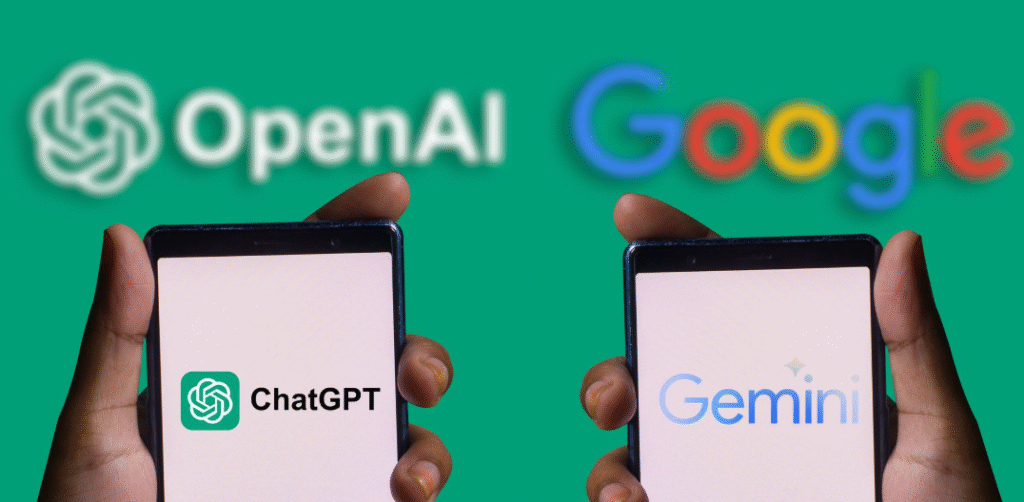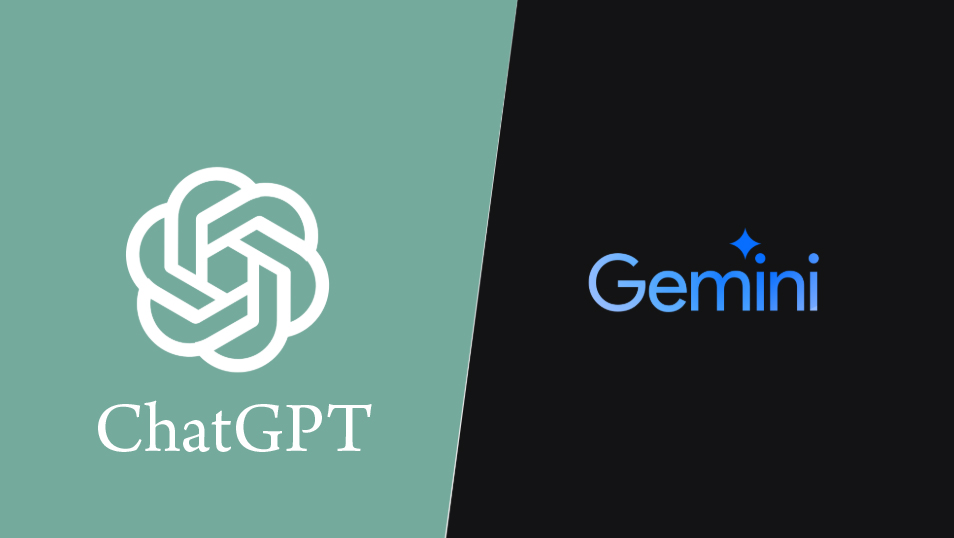Introduction
As artificial intelligence becomes an essential tool in modern software development, choosing the right AI coding assistant has never been more critical. In 2025, two frontrunners—ChatGPT by OpenAI and Gemini AI by Google DeepMind—are revolutionizing the way developers write, debug, and optimize code. Each platform offers powerful capabilities, but they cater to different programming styles, tool preferences, and development environments.
ChatGPT, powered by the advanced GPT-4 Turbo model, is known for its conversational depth, contextual understanding, and seamless integration with tools like VS Code and GitHub Copilot. In contrast, Gemini AI is favored for its real-time access to the web, Google Cloud integration, and performance in collaborative environments.
This article offers a detailed, side-by-side comparison of ChatGPT vs. Gemini AI—exploring features, usability, pricing, and real-world developer feedback—to help you determine which AI is best suited for your developer workflow in 2025.
Overview of ChatGPT and Gemini
In the rapidly evolving world of AI development tools, two giants dominate the conversation in 2025—ChatGPT and Gemini AI. Both platforms are at the forefront of AI-assisted programming, offering developers powerful features to accelerate coding, debugging, and software architecture tasks. Understanding their origins and core functionalities is essential for anyone looking to choose the best AI for developers.
ChatGPT, developed by OpenAI, is built on the advanced GPT-4 architecture (with GPT-4 Turbo in premium plans). Known for its human-like language generation and multi-turn conversation capabilities, ChatGPT has quickly become a go-to AI assistant for coding, learning, and task automation. Its seamless integration with tools like GitHub Copilot, Visual Studio Code, and browser extensions makes it incredibly valuable for both beginners and experienced developers.
On the other hand, Gemini AI (formerly Bard), launched by Google DeepMind, leverages deep integration with the Google Cloud ecosystem, Colab notebooks, and other proprietary Google services. With its ability to access real-time web results and enhanced memory features, Gemini is gaining popularity as a developer-focused AI for generating clean, executable code snippets and scalable software components.
Both tools promise high productivity and accuracy, but their architecture, platform focus, and integration flexibility present unique advantages depending on the developer’s environment and objectives.
Natural Language Processing and Code Generation
When it comes to natural language processing (NLP) and code generation, both ChatGPT and Gemini AI showcase powerful capabilities, but their performance differs in critical areas that matter most to developers.
ChatGPT, widely known as a top-tier AI code generator, excels in interpreting complex natural language prompts and converting them into clean, functional code. Developers praise its ability to generate code in multiple languages, including Python, JavaScript, C++, and TypeScript. Its fine-tuned understanding of context, variables, and logic flow makes it a reliable ChatGPT coding assistant for writing scripts, fixing bugs, and even explaining legacy code to junior developers.
Meanwhile, Gemini for programmers shines in structured, modular code generation. Backed by Google’s extensive datasets and real-time internet access (in Pro versions), Gemini delivers highly relevant, updated snippets—ideal for solving new coding challenges, especially in web development and cloud integration. Its output is often well-documented, with clearer formatting and optimization suggestions, which developers find helpful in production-level environments.
Both tools support automated code generation, but ChatGPT has an edge in conversational problem-solving, while Gemini offers superior integration with Google tools and current documentation.
In 2025, the choice between them often comes down to development style, preferred languages, and workflow integration—both offer game-changing support in modern AI-assisted software development.
Integration with Developer Tools
Seamless integration with existing tools is a key factor in determining which AI assistant for developers offers the best workflow experience. Both ChatGPT and Gemini AI provide strong support for popular IDE environments, cloud platforms, and collaboration tools—but with distinct advantages.

ChatGPT, especially through ChatGPT Plus and Pro plans, integrates natively with Visual Studio Code, Jupyter Notebooks, and GitHub Copilot. Developers benefit from real-time code suggestions, in-editor assistance, and AI-generated comments or documentation. Its browser extensions also allow use across Stack Overflow, Replit, and even command-line terminals. ChatGPT supports plugins for API testing, database querying, and deployment workflows, making it ideal for full-stack development.
On the other hand, Gemini AI (formerly Bard) excels in integration with Google’s cloud ecosystem. It is deeply embedded into Google Colab, Google Sheets, and Gmail, and it supports collaborative programming sessions within the Google Workspace. Gemini’s real-time internet access makes it especially valuable for on-the-fly code referencing and dataset manipulation.
🔍 Integration Comparison Table
| Tool | Supported IDEs | Cloud/DevOps Tools | Plugin/Extension Support |
| ChatGPT | VS Code, Jupyter, Replit | GitHub, Docker, Postman | Yes – via Pro plugins |
| Gemini AI | Google Colab, VS Code | Google Cloud, Sheets, Gmail | Yes – native Google tools |
For developers focused on cross-platform coding and flexibility, ChatGPT is often the preferred AI coding assistant. For those embedded in the Google ecosystem, Gemini offers unmatched synergy.
Performance, Speed, and Usability
When comparing ChatGPT and Gemini AI in terms of performance, speed, and usability, both tools deliver fast and reliable assistance—but subtle differences can impact the developer experience.
ChatGPT, particularly the GPT-4 Turbo model available in Pro plans, is praised for its fast response time, even when handling long prompts or complex multi-turn coding conversations. It offers higher token limits, allowing users to work with large codebases and in-depth debugging sessions without needing to truncate context. Its intuitive chat interface, real-time memory (coming soon), and interactive plugin support make it a top choice for developers who value both speed and context retention.
Gemini AI, powered by Google’s AI infrastructure, also performs exceptionally well in terms of speed, especially for code lookup, API integration, and web-based tasks. It excels at quickly retrieving up-to-date information thanks to live internet access—something ChatGPT currently lacks in its base model. Gemini’s usability shines in Google-native environments, but it can sometimes feel less fluid for deep, multi-layered programming conversations.
From a usability standpoint, ChatGPT offers a smoother, more personalized interaction, while Gemini’s performance is optimized for structured tasks and developer workflows tied to Google Workspace.
In addition, developers prioritizing speed, deep conversational flow, and project continuity may lean toward ChatGPT, whereas those needing fast, factual outputs tied to cloud services might prefer Gemini.
Pricing and Accessibility
For developers, choosing the right AI assistant often comes down to cost-effectiveness and platform accessibility. Both ChatGPT and Gemini AI offer free and premium options, but their pricing structures and feature availability vary considerably in 2025.
ChatGPT provides a free tier based on GPT-3.5, which is suitable for light use. However, most developers prefer the ChatGPT Plus plan at $20/month, which gives access to GPT-4 Turbo—a faster and more capable model with extended token limits. This premium version also unlocks plugin access, code interpreter (advanced data analysis), and upcoming memory features that enhance project continuity and developer productivity.
Gemini AI, now rebranded and managed by Google DeepMind, offers its Gemini 1.5 Pro model through Google accounts. It is currently available for free to individual users via Google Bard, though enterprise-level access via Google Workspace (Gemini for Business) incurs additional licensing costs. For developers, Gemini’s appeal lies in its tight integration with Google tools, making it an excellent choice for those already using Google Cloud.
💡 Pricing & Accessibility Comparison
| Tool | Free Tier | Premium Price | Features in Paid Version |
| ChatGPT | GPT-3.5 | $20/month (Plus) | GPT-4 Turbo, plugins, code interpreter |
| Gemini AI | Gemini 1.5 (Free) | Included in Workspace tiers | Google integration, Pro model, AI summaries |
For developers weighing value and access, ChatGPT offers more specialized AI features for coding, while Gemini shines in collaborative and integrated cloud environments.
Security and Privacy Considerations
In 2025, as developers increasingly rely on AI assistants to handle proprietary code, API keys, and business logic, security and privacy become non-negotiable factors. Both ChatGPT and Gemini AI prioritize safety, but their approaches and compliance levels differ—especially for enterprise-grade development environments.
🔒 Data Privacy & Confidentiality
ChatGPT, developed by OpenAI, assures users that prompts and data shared through ChatGPT Plus are not used for training the model. Additionally, enterprise customers using ChatGPT Team or Enterprise plans get advanced security features, such as data encryption, SSO, and admin-level access controls. These models are designed with source code confidentiality in mind, making them a trusted option for sensitive development work.
Gemini AI, under Google DeepMind, follows Google’s security framework, which includes ISO/IEC certifications, GDPR compliance, and end-to-end encryption. Gemini for Workspace offers administrative controls, data residency options, and integration within a secure cloud environment—ideal for businesses already operating on Google Cloud Platform.
✅ Compliance and Enterprise Readiness
Both platforms offer strong compliance features, but ChatGPT provides more direct transparency and enterprise-specific agreements. Gemini, while secure, leans more on Google’s broader infrastructure and may require additional setup for isolated use cases.
In summary, both AI tools meet high standards for AI data privacy and developer trust, but developers working with highly sensitive codebases may prefer ChatGPT’s dedicated enterprise security model.
Real-World Developer Feedback
In 2025, developer communities on platforms like GitHub, Reddit, and Stack Overflow have been actively sharing their experiences with both ChatGPT and Gemini AI. Overall, ChatGPT continues to receive strong praise for its conversational accuracy, depth of code explanations, and ability to debug complex logic. Many developers highlight its effectiveness as a coding co-pilot, especially when integrated with VS Code or GitHub Copilot.
On the other hand, Gemini AI is gaining traction for its Google-native integration and real-time access to documentation. Users frequently note its strength in solving web development and cloud-related queries, particularly when working within the Google Cloud Platform or Colab environments.
However, some developers feel Gemini lacks the contextual depth and memory of ChatGPT when dealing with multi-step coding projects. ChatGPT, especially with its Pro features, is often preferred for sustained project workflows and deep refactoring tasks.
In conclusion, while both tools are enhancing developer productivity with AI, the choice often depends on environment preference: ChatGPT for flexibility and conversational clarity, and Gemini for integrated, real-time reference within Google’s ecosystem.
Final Verdict: Which AI is Best for Developers?
Choosing between ChatGPT and Gemini AI ultimately depends on your development style, environment, and use case. For developers seeking a versatile, conversational coding assistant, ChatGPT—especially the GPT-4 Turbo model—offers unparalleled accuracy, deep contextual understanding, and robust plugin support. It excels in handling long prompts, debugging complex logic, and providing clear code explanations, making it ideal for backend development, automation scripts, and full-stack workflows.
In contrast, Gemini AI shines in real-time knowledge retrieval, cloud integration, and collaborative development within the Google Workspace ecosystem. It’s particularly well-suited for frontend tasks, rapid prototyping, and projects involving Google services or live documentation.
If you’re a freelancer, startup developer, or someone working across multiple stacks, ChatGPT offers better flexibility and advanced features like code interpreter and memory (Pro/Enterprise tiers). For teams deeply embedded in Google’s infrastructure, Gemini provides a frictionless, secure AI experience.
In short, both tools are among the best AI platforms for developers in 2025, but ChatGPT stands out for depth and versatility, while Gemini wins on real-time integration and simplicity.
Conclusion
In 2025, the competition between ChatGPT and Gemini AI marks a significant leap forward in AI-assisted software development. Both platforms have transformed how developers write, debug, and deploy code—offering smart, responsive, and context-aware solutions that boost productivity and innovation.
ChatGPT excels with its conversational fluency, deep code understanding, and wide tool integration—making it the preferred AI assistant for developers seeking versatility and depth. Meanwhile, Gemini AI stands out for its real-time access to information and seamless operation within the Google ecosystem, ideal for teams focused on collaborative, cloud-based projects.
Ultimately, the best choice depends on your specific development needs, tool preferences, and work environment. As AI continues to evolve, mastering tools like ChatGPT and Gemini will be key to staying competitive in the ever-changing landscape of modern software engineering.


